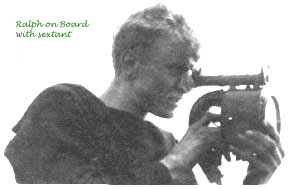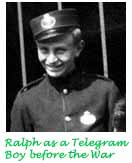

|
|||||
| Ralph Stobart Robson, signalman, life in the British Royal Navy World War Two, sinking of Prince of Wales and the Repulse, Singapore | |||||
|
|||||
|
|||||
|
While I was struggling to accomplish my task, Japanese twin-engined bombers were swooping down low and machine-gunning the ship. As soon as I had finished I turned back towards the Signal Office. Taking a quick peep at the upper deck I saw a dead gunner bisected by machine-gun fire, his lower torso on the deck below. Blood was spattered over a wide area. I dived into the Signal Office, too numb with shock to even mention it. About twenty minutes later the first torpedo struck. Some twenty minutes after that we were ordered to abandon ship. The Repulse was listing badly to port (left). I stood with one foot on the rail and one on the deck. Men were scrambling down as best they could. Some slithered on their backs. I managed to walk and eventually reached the water and walked into the sea. It was vital to swim as far away from the ship as possible in case we were sucked under when she sank. There was no panic. Fortunately it didn't occur to us that we were in shark-infested waters. Strangely enough, no sharks ever appeared, nor were any reported. After we had swum for about a hundred yards, I turned to watch Repulse, waitng for her to go down. It was an awesome sight. Nearly an hour later we watched the Price of Wales as she too foundered about three miles away. The destroyers H.M.S. Electra and H.M.A.S. Vampire began their rescue work. Their sister ship the Express was alongside the Prince of Wales rescuing as many of the crew as she could. I noticed a seaman thrashing about in the water and swam over to help him. Later I always thought of him as 'The Blackman', because the poor bloke was smothered all over with fuel oil. He must have jumped off the ship into the middle of a swelling pool of oil. He didn't hear me approach and gave a startled gasp as I touched him. I did my best to calm him and convey to him that we were heading towards rescue. Grabbing him under the armpits I started to swim towards the Electra. I seemed to have been swimming for miles before I got alongside the destroyer which was crammed with survivors. Thankfully I grabbed hold of the rope netting above which sailors were helping people on board. One sailor told me to climb aboard too. "I can," I called, "but this bloke can't." Two sailors immediately climbed down the boarding netting and with some difficulty hauled 'The Blackman' aboard. Wearily I followed. Once on the deck of the Electra, I realised how limited my vision had been while swimming below. I gazed at the surface of the sea which was covered with the detritus of the sunken vessels. There were dead men, carley floats, launches, pieces of wood and other debris. 'The Blackman' was lying near one of the deck houses and I slumped down beside him, totally exhausted. Presently the nets were pulled on board and we got underway. I didn't realise it at the time but it was the end of an era. No longer would battleships be considered the masters of the ocean. They had been conquered by machines a mere fraction of their size. Aircraft were now masters of both air and sea. The crew of the Electra had been engaged all this time in rescuing the survivors. 'The Blackman' had been taken below by a Sick Berth Attendant. I went to the rail and saw the same Attendant coming back along the deck. I asked him how 'The Blackman' was and he said, "Sorry mate, but he was dead when he was pulled aboard." It was nearly two o'clock before the search for survivors was called off. I had asked earlier if there was anything I could do to help but was told that everything was under control. At two o'clock Commander May of Electra, who was now commanding officer, ordered Express and Vampire to make a last sweep and then proceed to Singapore. An hour later, dangerously loaded with survivors, they departed. Commander May took his ship on a last sweep and then we took off for harbour. I found out later that the three ships had landed 2,081 survivors plus those who died on board. We left behind boats, carley floats, lots of oil and all kinds of floating debris as well as many dead bodies. While the rescue was taking place, Japanese planes could be seen high overhead but they made no attempt to molest us. In view of their behaviour before the sinkings and subsequent behaviour as the war progressed, this inaction seemed inexplicable. They were reputed to have returned the next day and thrown a wreath where the two British ships had sunk. We made our way south in the Gulf of Siam on a smooth oily sea, eventually rounding the Anambas Islands and steering west to the naval base harbour. We tied up at around midnight preceded by Vampire and Express. On the quay there was great confusion. Dazed survivors stumbled ashore in a motley collection of clothing. Many had discarded garments before abandoning ship so as not to be weighed down in the water. Few had footwear and what clothing they had was oil stained and filthy like the overalls I wore myself. The little ships were littered with blood-stained bandages and oily clothes. Men gathered on the quayside under arc lights and beneath the shadow of a gigantic crane. Some had been given rum aboard the destroyers and were now offered more. It had been discovered that the rum made them vomit, thus bringing up any oil they had swallowed. Some of the helpers who welcomed us ashore were under the impression that we had been in action against a large Japanese battle fleet. They were stunned when we disillusioned them. Indeed it seemed incredible that such a disaster had been caused by a few aeroplanes. Some semblance of order was restored and the dead bodies taken away. We were led to a series of tables and chairs where details of our names, service numbers and rank were recorded. When asked for the name of the ship from which I had survived, I naturally said, "Repulse." I had only been on board for three days before setting out on that fateful voyage but assumed that I had been listed as a member of her ship's company. We were then marched along the dockyard and up the hill to H.M.S. Sultan where we were given accommodation and a meal. H.M.S. Sultan was quite a large barrack complex which, I was told, was a gift to the British navy from a previous Sultan of Johore. As soon as I lay down, I went out like a light. It had been the longest day of my life. For 840 of my shipmates it had been the last. |
|||||
|
|||||
